Science Night returned this year, better than ever! This annual event, hosted by the Prince William Regional Citizens Advisory Council, focuses on research related to the safe transportation of oil through Prince William Sound.
News Release Archives
Council updates position on dispersant use during an oil spill
Prevention and mechanical recovery should remain primary options
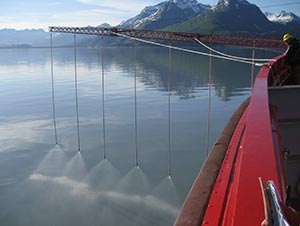
The Council’s Board of Directors has updated the organization’s position on use of chemical dispersants in the event of an oil spill in the Prince William Sound and the Exxon Valdez oil spill region. The updated position states that dispersants should not be used on Alaska North Slope crude oil spills in the waters of our region.
Chemical dispersants are substances applied to floating oil slicks that break the oil into smaller droplets that disperse into the water column.
The Council has long endorsed mechanical recovery as the primary tool to clean up an oil spill. Unlike dispersant use, mechanical recovery with booms and skimmers removes oil from the water. Conditions in Prince William Sound often limit the feasibility of dispersant application and dispersants have not been demonstrated to be effective in marine environments with similar temperatures and salinity levels to those found in the Sound. Uncertainty exists over the toxicity caused by adding chemical dispersants to an oil slick and the long-term effects of dispersants application are not well understood. The known harms and potential risks caused by dispersants, in addition to a lack of proven effectiveness and safety, preclude the Council from supporting dispersants.
Oil spill prevention remains the Council’s top priority because once oil is spilled there will always be adverse impacts to human health and the environment. In the event of an oil spill in our region, mechanical recovery and containment of oil spilled at sea should remain the primary response method. The Council also recommends that oil spill response research and development should focus on enhancing and improving mechanical recovery technologies and methods.
The Council’s previous position on dispersant use was adopted in 2006, after years of promoting research and testing to increase knowledge about dispersants and the environmental consequences of their use. In the intervening years, the Council has continued to track developments and analyze peer reviewed scientific literature from around the world regarding the use of dispersants. Discussion and work to develop this update have occurred over the past year, with the final approval taking place at the directors’ meeting in Seward, Alaska, on September 23, 2022.
Details
Further materials on the evidence and rationale supporting the position update are currently being finalized by the Council for publication in early 2023.
PDF of news release:
Board of Directors met in Seward
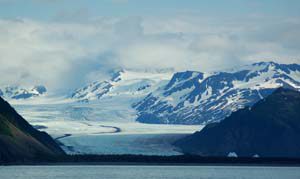 The Council’s Board of Directors met in Seward on September 22 and 23, 2022.
The Council’s Board of Directors met in Seward on September 22 and 23, 2022.
The Council conducted regular business during the meeting, including updates from Council ex officio members, staff and committees. Other topics included on the agenda were:
- An activity report by Alyeska Pipeline Service Company on the Valdez Marine Terminal and Ship Escort Response Vessel System operations.
A review of new designs for the replacement of the floor, and a system to limit corrosion within the floor, for one of the crude oil storage tanks at the Valdez Marine Terminal. - An update from Council staff and contractors and Alyeska staff on the monitoring of repairs and next steps resulting from snow and ice damage to tank vents at the Valdez Marine Terminal in February and March 2022.
- Introduction and remarks from Interim Alyeska President Betsy Haines.
- A video based on field trials for a recent Council study on passing messenger lines to disabled vessels, the first crucial step in setting up a tow line between a rescue tug and a tanker in distress.
- Discussion to potentially update the Council’s 2006 position on use of dispersants in our region during an oil spill.
- A report on the availability of out-of-region equipment that would be needed in the event of a major oil spill in our region.
- A review and assessment of the Council’s Peer Listener Training Program and similar programs nationwide that promote peer-to-peer community support, specifically after disasters such as an oil spill.
- A report on plankton sampling done throughout Port Valdez in 2021, to understand how these populations varied to improve the monitoring of invasive species.
- A presentation on marine bird surveys conducted in Prince William Sound in March of 2022.
Council Board meetings are routinely recorded and may be disseminated to the public by the Council or by the news media.
Council announces election of Board officers
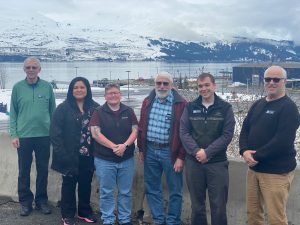
The Council held its annual Board meeting in Valdez, Alaska, on May 5-6, 2022. Among other business, the Board convened to elect officers who will serve from May 2022 to May 2023.
The elected executive committee is comprised of:
- President: Robert Archibald, representing the City of Homer
- Vice President: Amanda Bauer, representing the City of Valdez
- Treasurer: Wayne Donaldson, representing the City of Kodiak
- Secretary: Bob Shavelson, representing the Oil Spill Region Environmental Coalition
- Three Members-at-Large:
- Ben Cutrell, representing Chugach Alaska Corporation
- Robert Beedle, representing the City of Cordova
- Angela Totemoff, representing the Community of Tatitlek
“I am honored to serve as president of the Board for another year,” said Robert Archibald. “As one of two regional citizens advisory councils in the nation, it is incumbent upon our organization to hold accountable industry and regulators. It is essential that the highest safety standards are maintained in order to prevent oil spills and make sure there is a strong response system in place should prevention measures fail in order to protect the citizens, Valdez Marine Terminal workforce, associated tanker crews, and Alaska’s environment which we hold so dear.”
The Council is grateful to have the support of its many volunteers from all over the Exxon Valdez oil spill region. The new executive committee is an excellent representation of the Council.
New members seated
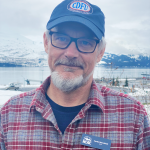
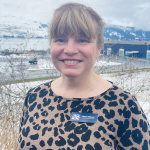
The Board seated two new members. Curtis Herschleb was appointed by Cordova District Fishermen United to fill the seat held by Patience Andersen Faulkner, who retired this year. Aimee Williams has been appointed by the Kodiak Island Borough to fill the seat previously held by Rebecca Skinner.